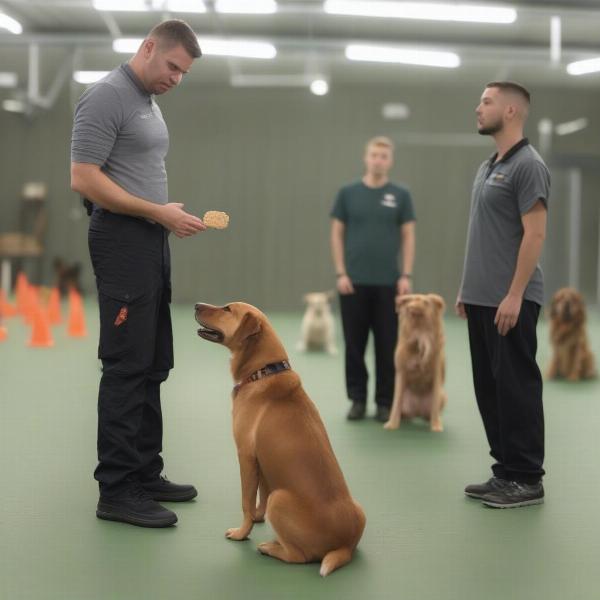A 3 week dog training camp can be a transformative experience for both you and your furry friend. Whether you’re dealing with behavioral issues, looking to build a strong foundation of obedience, or aiming for advanced skills, an intensive program like this can offer significant benefits. This comprehensive guide will explore what to expect from a 3 week dog training camp, the advantages and disadvantages, choosing the right program, and making the most of the experience.
What to Expect at a 3 Week Dog Training Camp
A typical 3 week dog training camp involves immersive training sessions focused on various aspects of canine behavior and obedience. These camps can be residential, where your dog stays at the facility, or non-residential, with daily training sessions and your dog returning home each evening. Programs often cover basic commands like sit, stay, come, and heel, as well as more advanced skills like leash walking, recall, and socialization.
 Dog learning commands at a 3 week dog training camp
Dog learning commands at a 3 week dog training camp
Many camps also address specific behavioral problems such as aggression, anxiety, or excessive barking. The structured environment, consistent training, and expert guidance can be highly effective in modifying unwanted behaviors. The intensity of a 3 week program allows trainers to delve deeper into the root causes of these issues and implement personalized training plans.
Advantages of a 3 Week Dog Training Camp
- Rapid progress: The immersive nature of these camps allows for concentrated training, resulting in faster progress compared to traditional weekly classes.
- Expert guidance: Experienced trainers provide professional instruction and personalized feedback, tailoring the training to your dog’s specific needs.
- Structured environment: The controlled environment minimizes distractions and helps dogs focus on learning.
- Socialization opportunities: Many camps incorporate socialization activities, helping dogs learn to interact appropriately with other dogs and people.
- Behavioral modification: Intensive programs can effectively address behavioral problems through targeted training and behavior modification techniques.
Disadvantages of a 3 Week Dog Training Camp
- Cost: 3 week programs can be more expensive than other training options.
- Separation anxiety: For residential camps, some dogs may experience separation anxiety when away from their owners.
- Intense environment: The rigorous training schedule may not be suitable for all dogs, particularly those with health issues or anxieties.
Choosing the Right 3 Week Dog Training Camp
- Research and reviews: Look for reputable camps with positive reviews and testimonials.
- Trainer qualifications: Ensure the trainers are experienced and certified.
- Training methods: Choose a camp that uses positive reinforcement methods.
- Facilities: Inspect the facilities to ensure they are clean, safe, and provide adequate space for the dogs.
- Program customization: Opt for a camp that offers personalized training plans to address your dog’s specific needs.
Making the Most of Your Dog’s Training Camp Experience
- Communication with trainers: Maintain open communication with the trainers throughout the program.
- Consistency after camp: Continue practicing the commands and techniques learned at camp to reinforce the training.
- Follow-up support: Many camps offer follow-up support or refresher courses to help maintain progress.
Conclusion
A 3 week dog training camp can be a valuable investment in your dog’s well-being and your relationship. By carefully choosing the right program and actively participating in the process, you can maximize the benefits and enjoy a well-trained, well-behaved companion for years to come.
FAQs
- How much does a 3 week dog training camp typically cost? Costs vary depending on the location, facilities, and program specifics but can range from $1,500 to $3,000 or more.
- Is a 3 week training camp suitable for all breeds? Most camps can accommodate various breeds, but it’s crucial to discuss your dog’s specific needs and temperament with the trainers beforehand.
- What should I pack for my dog’s residential training camp? Essential items include food, medication (if any), bedding, favorite toys, and vaccination records.
- Can I visit my dog during a residential training camp? Visitation policies vary between camps; some allow regular visits, while others may restrict them to specific times or not at all.
- What happens if my dog doesn’t respond well to the training? Reputable camps will work with you to address any challenges and adjust the training plan as needed.
- Will my dog forget the training after returning home? Consistent practice and reinforcement are key to maintaining the training after camp.
- Are there any age restrictions for dogs attending training camps? While most camps accept adult dogs, some may offer specialized programs for puppies or senior dogs.
ILM Dog is your trusted resource for expert dog care advice. We offer comprehensive information on everything from breed selection and health care to training, nutrition, grooming, and travel. Whether you’re a new dog owner or a seasoned pro, our expert advice will help you provide the best possible care for your canine companion. dog travel beds are essential for comfortable travel with your pet. For personalized advice and to learn more about our services, including expert tips on raw dog food turkey and dog friendly accommodation albany wa, contact us at [email protected] or call +44 20-3965-8624. ILM Dog is here to support you every step of the way. Explore our selection of douglas toys dog and elevated dog kennel for your furry friend.